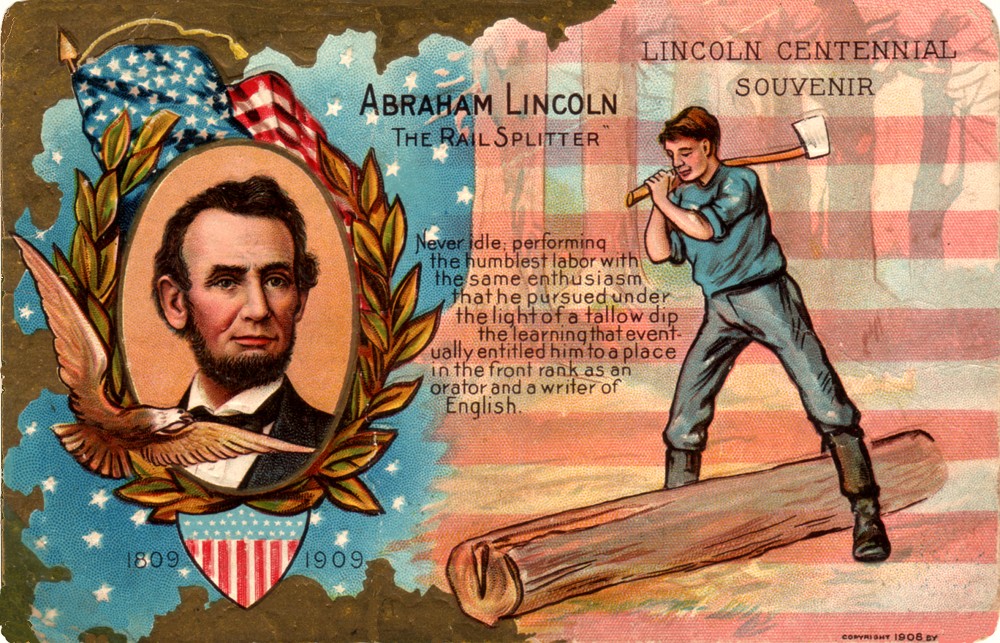To the People of Sangamo County
New Salem, Illinois: 9 March 1832
by Abraham Lincoln
collected in —
The Collected Works of Abraham Lincoln, Volume I: 1824-1848
Speeches and Writings: 1832-1858
A young man's goal of Classical nobility
Abraham Lincoln stood for the Illinois legislature in early 1832. His very early speech, the announcement of candidacy in "To the People of Sangamo County" includes, toward the end, the following simple self-characterization:
Every man is said to have his peculiar ambition. Whether it be true or not, I can say for one that I have no other so great as that of being truly esteemed of my fellow men, by rendering myself worthy of their esteem.
The first point to notice is that the above states a Classical principle of character, in two parts: that a noble man should desire to be highly regarded by his fellows; and that he deserve this respect.
The second point is that Abraham Lincoln had, one month previously, turned twenty-three years old. It is a wise child that knows his philosophical fathers. Lincoln goes on to say:
How far I shall succeed in gratifying this ambition, is yet to be developed. I am young and unknown to many of you. I was born and have ever remained in the most humble walks of life. I have no wealthy or popular relations to recommend me. My case is thrown exclusively upon the independent voters of this county, and if elected they will have conferred a favor upon me, for which I shall be unremitting in my labors to compensate. But if the good people in their wisdom shall see fit to keep me in the background, I have been too familiar with disappointments to be very much chagrined. Your friend and fellow citizen,A. LINCOLN.
New Salem, March 9, 1832
Lincoln devotes the bulk of this brief presentation to the value and practicality of improving navigation on the Sangamo River. But it is his own forward navigation of which we have caught our more valuable glimpse.
Friedrich Nietzsche devoted considerable meditation to questions of leadership, esteem and nobility. Walter Kaufmann in his biography-critique, Nietzsche, in the chapter "The Discovery of the Will to Power", discusses the history of culture in the light of "Homer's Contest" and "The Striving for Excellence" (section 113 in The Dawn / Daybreak). All of this has some bearing on the way Lincoln conceived the American experience, and himself.
I find it not the least astonishing thing about Abraham Lincoln that he could have been so clear about himself, so early.
Harry Jaffa provides a keen analysis of this:
To put the problem in its classic form: Are the things that make a man worthy of the esteem of his fellow men the same as the things that cause him to be esteemed? In a sense the whole case for popular government rests upon the affirmation of the ultimate identity of the two; even as the case against popular government, from Plato's "Apology of Socrates" on down, has rested upon the denial of their compatibility, much less identity. ...
Woodrow Wilson once remarked that the phenomenon of Lincoln had made it possible to believe in democracy. Wilson was acutely sensitive to the tension between love of fame and love of excellence; he knew that their reconciliation was problematical and that democracy, not as something to be suffered, but as something to be loved, as an embodiment of man's aspiration, required a conviction that a man of the people, chosen by the people, could exemplify moral and intellectual greatness. ...
Noble things are difficult, said Aristotle, and the nobler more difficult. Lincoln saw popular government as most noble and most difficult.
Harry V. Jaffa
"The Teaching Concerning Political Salvation"
Crisis of the House Divided
An Interpretation of the Issues
in the Lincoln-Douglas Debates (1959; 1982)
© 2009 Robert Wilfred Franson
Pamphlet reviews by Title
Articles, Documents, Essays, Speeches,
& other miscellaneous Fragments

| Troynovant, or Renewing Troy: | New | Contents | |||
| recurrent inspiration | Recent Updates | |||
|
www.Troynovant.com |
||||
|
Reviews |
||||
| Personae | Strata | Topography |
|
|||